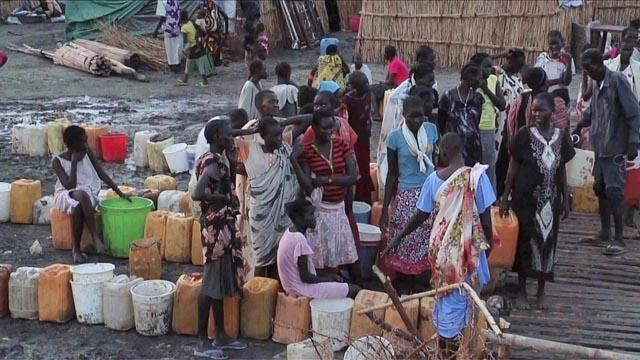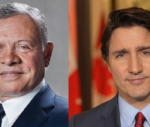You are here
South Sudan battles rage as Kerry warns of ‘serious’ consequences
By AFP - May 05,2014 - Last updated at May 05,2014
JUBA — South Sudanese troops and rebels battled around a key oil hub on Monday, defying mounting pressure to end four months of civil war despite US threats of “serious implications” if fighting continues.
The government offensive to seize the northern oil town of Bentiu from rebel forces comes just days after a visit from US Secretary of State John Kerry to the capital Juba, where he extracted promises that peace talks would resume to end violence in the world’s youngest nation.
“Let me make clear: If there is a total refusal by one party or the other to engage into a legitimate promise which they agreed on... not only might sanctions be engaged but there are other serious implications and possible consequences,” Kerry said, speaking in the Angolan capital Luanda on the last leg of his African tour.
So far, US-backed diplomatic efforts have struggled to gain traction, with reports that both the government forces of President Salva Kiir and rebel chief Riek Machar are continuing to commit war crimes that have included mass killings, rapes, attacks on hospitals and places of worship, and recruiting child soldiers.
A January ceasefire was never enforced. Stop-start peace talks in Ethiopia have yet to forge agreement on even the basic agenda, despite warnings from the United Nations that the conflict threatens mass famine and genocide.
“There is accountability in the international community for atrocities, there are sanctions, there are possible... peace making forces, there are any number of possibilities,” Kerry said.
South Sudan’s army spokesman Philip Aguer said there had been heavy fighting on Monday focused on Bentiu, capital of the oil-producing Unity state, a day after government troops moved to wrest back control.
“We are fighting in and around Bentiu to take back control,” he told AFP. “They are resisting but we have the upper hand.”
Rebel chief ‘fleeing’ assault
Bentiu fell to the rebels last month. They were accused by the United Nations of massacring hundreds of civilians in the process. The town has swapped hands several times.
Despite the fighting, Juba said it was committed to peace talks and that the president remained determined to meet with his archrival, the former vice president turned rebel leader Machar.
“Of course the president [Kiir] is willing to meet face-to-face with the rebel leader [Machar]so that they sit together to bring peace in the country,” foreign ministry spokesman Mayen Makol told AFP, insisting talks would happen “as soon as possible”.
In Ethiopia, rebel and government delegates reaffirmed their commitment to a January deal to open aid corridors into war zones.
Such agreements have been repeatedly flouted in the past but rebel delegate Taban Deng hailed the latest confirmation as a “step towards peace”.
“We have, for the last four days, been looking how best we can save our people through those difficult times, especially now the rain is coming,” regional mediator Lazaro K. Sumbeiywo said.
The imminent arrival of the monsoon season will be a further obstacle to already difficult humanitarian work.
The army said Machar is hiding in remote bush after fleeing the government’s successful capture of his base at Nasir, a riverside town close to the Ethiopian border.
“We are in control of Nasir and all is quiet there, with the forces of Machar on the run,” Aguer said. “We believe he is hiding out somewhere near the frontier with Ethiopia.”
Machar himself has not confirmed whether he will attend peace talks, although Kerry repeated on Monday that the rebel leader had “left the door open” to taking part.
Since it broke out in December, the war has claimed thousands — and possibly tens of thousands — of lives, with at least 1.2 million people forced to flee their homes, many living in appalling conditions in overstretched UN bases and in fear of ethnic violence.
Although it started as a personal rivalry between Kiir and Machar after the latter was sacked as vice president, the conflict has taken on ethnic overtones as clashes pit members of Kiir’s Dinka tribe against Machar’s Nuer.
Production at the oil fields — a crucial asset for the protagonists — has slumped as staff have been evacuated.
“Oil areas have been affected by rebel attacks as they killed the engineers... but in terms of control they are in our hands,” said Aguer.
Related Articles
South Sudanese government troops were Saturday battling to recapture Bor, the last remaining rebel-held town, the army said, a day after wresting control of a key northern oil city.
The White House has expressed horror at what it called the “abomination” of spiralling violence in South Sudan’s civil war, where rebels have been accused of massacring hundreds of civilians.
Government forces and rebels fought fresh battles across South Sudan on Sunday, vowing to step up their offensives as regional peace brokers struggled to get ceasefire talks off the ground.















